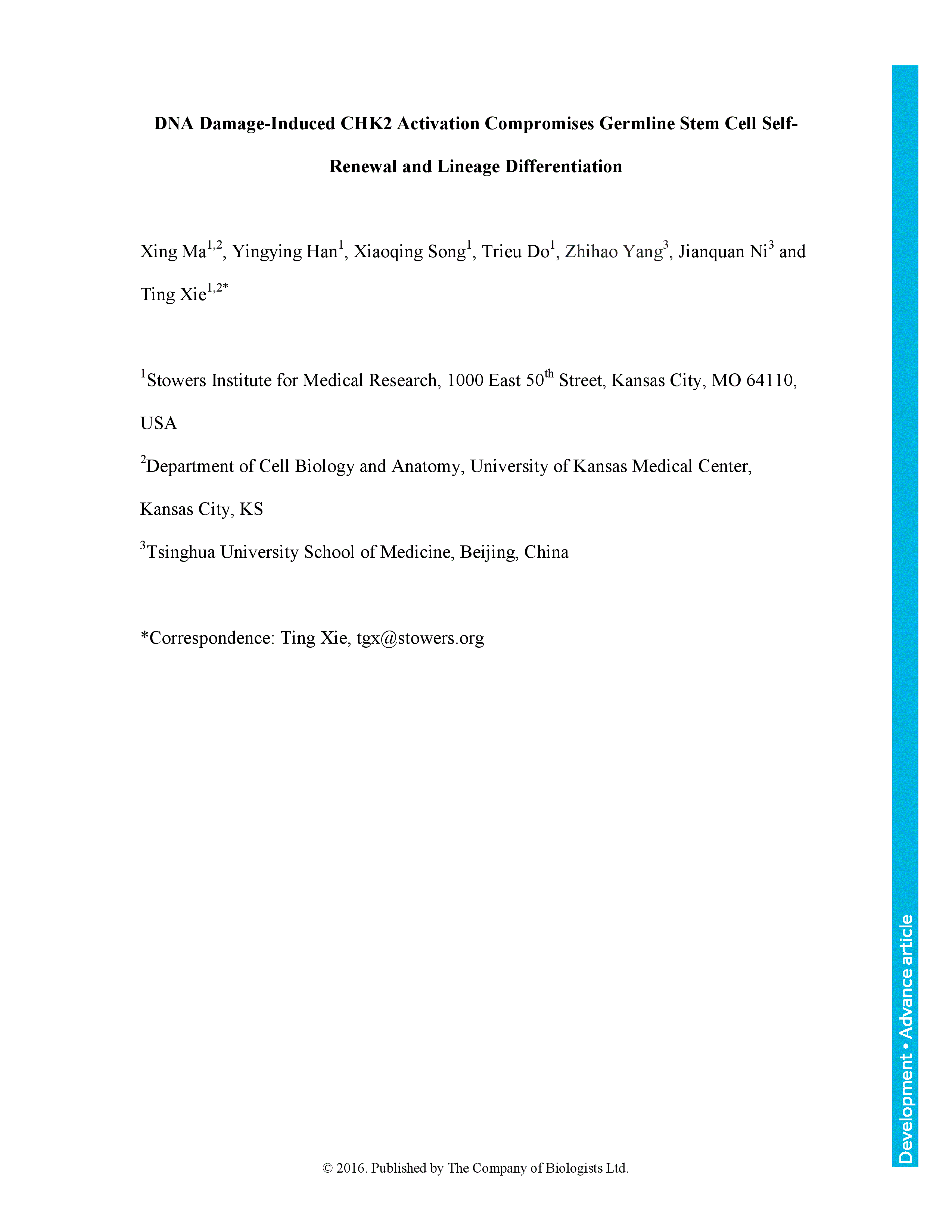Stem cells in adult tissues are constantly exposed to genotoxic stress and also accumulate DNA damage with age. DNA damage has been proposed to cause stem cell loss and cancer formation. However, it remains a mystery how DNA damage leads to both stem cell loss and cancer formation. In this study, we use germline stem cells (GSCs) in the Drosophila ovary to show that DNA damage retards stem cell self-renewal and lineage differentiation in a CHK2 kinase-dependent manner. Both heatshock-inducible endonuclease I-CreI expression and X-ray irradiation can efficiently introduce double-strand breaks in GSCs and their progeny, resulting in a rapid GSC loss and an accumulation of ill-differentiated GSC progeny. Elimination of CHK2 or its kinase activity can almost fully rescue the GSC loss and the progeny differentiation defect caused by DNA damage induced by I-CreI or X-ray. Surprisingly, checkpoint kinases ATM and ATR have distinct functions from CHK2 in GSCs in response to DNA damage. The reduction in BMP signaling and E-cadherin only makes limited contribution to DNA damage-induced GSC loss. Finally, DNA damage also decreases the expression of the master differentiation factor Bam in a CHK2-dependent manner, which helps explain the GSC progeny differentiation defect. Therefore, this study demonstrates, for the first time in vivo, that CHK2 kinase activation is required for the DNA damage-mediated disruption of adult stem cell self-renewal and lineage differentiation, and might also offer novel insight into how DNA damage causes tissue aging and cancer formation. Our study also demonstrates that inducible I-CreI is a convenient genetic system for studying DNA damage responses in stem cells.
DNA damage-induced CHK2 activation compromises germline stem cell self-renewal and lineage differentiation
Currently Viewing Accepted Manuscript - Newer Version Available
Xing Ma, Yingying Han, Xiaoqing Song, Trieu Do, Zhihao Yang, Jianquan Ni, Ting Xie; DNA damage-induced CHK2 activation compromises germline stem cell self-renewal and lineage differentiation. Development 2016; dev.141069. doi: https://doi.org/10.1242/dev.141069
Download citation file:
Advertisement
Call for papers: Uncovering Developmental Diversity

Development invites you to submit your latest research to our upcoming special issue: Uncovering Developmental Diversity. This issue will be coordinated by our academic Editor Cassandra Extavour (Harvard University, USA) alongside two Guest Editors: Liam Dolan (Gregor Mendel Institute of Molecular Plant Biology, Austria) and Karen Sears (University of California Los Angeles, USA).
Choose Development in 2024

In this Editorial, Development Editor-in-Chief James Briscoe and Executive Editor Katherine Brown explain how you support your community by publishing in Development and how the journal champions serious science, community connections and progressive publishing.
Journal Meeting: From Stem Cells to Human Development

Register now for the 2024 Development Journal Meeting From Stem Cells to Human Development. Early-bird registration deadline: 3 May. Abstract submission deadline: 21 June.
Pluripotency of a founding field: rebranding developmental biology

This collaborative Perspective, the result of a workshop held in 2023, proposes a set of community actions to increase the visibility of the developmental biology field. The authors make recommendations for new funding streams, frameworks for collaborations and mechanisms by which members of the community can promote themselves and their research.
Read & Publish Open Access publishing: what authors say

We have had great feedback from authors who have benefitted from our Read & Publish agreement with their institution and have been able to publish Open Access with us without paying an APC. Read what they had to say.



